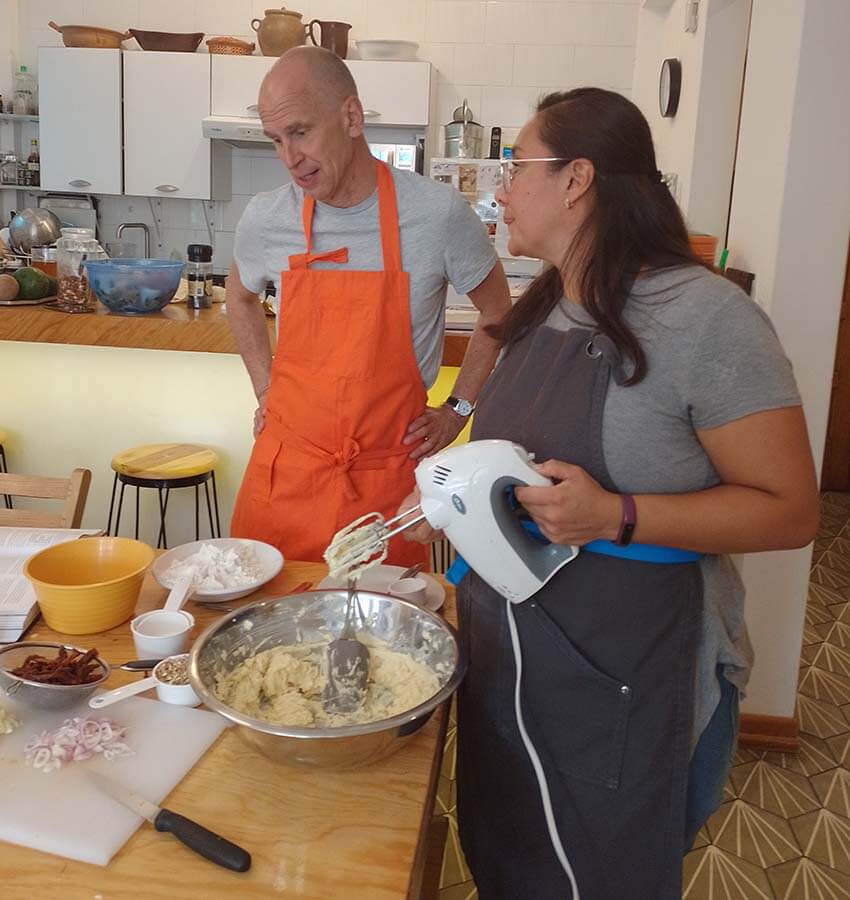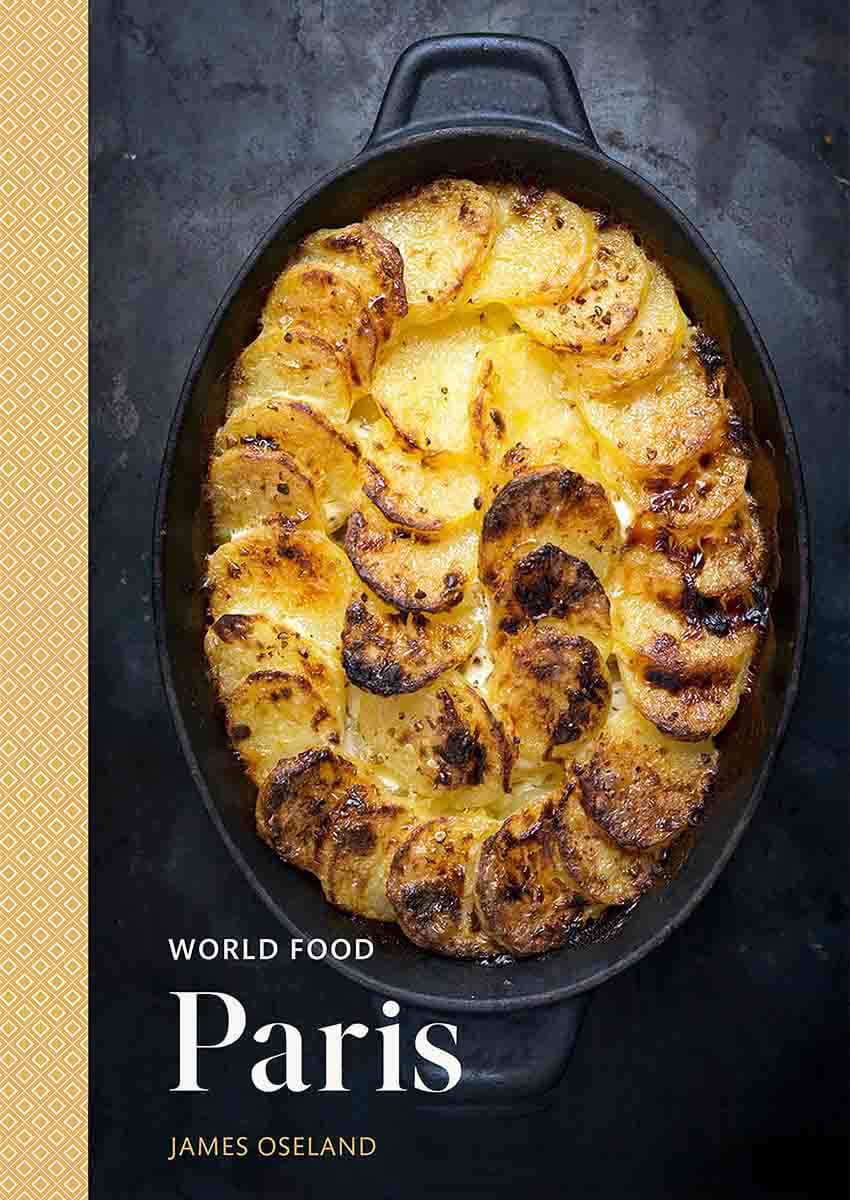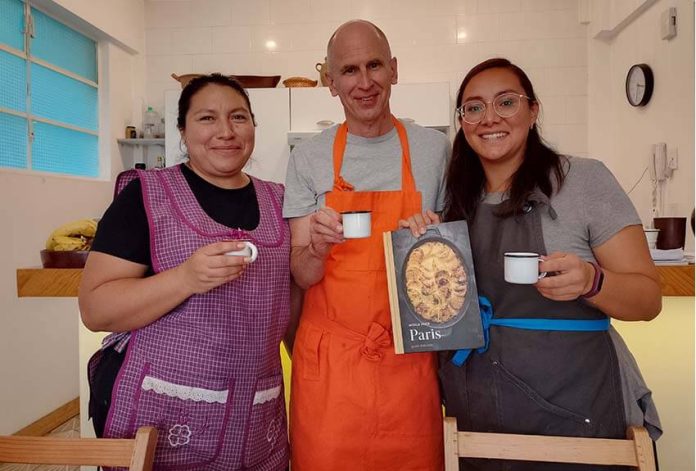James Oseland may be an award-winning food writer from New York, but the local cooks he works with in Mexico City are the secret behind his latest cookbook on French cooking.
Two of these cooks, María Ester Godínez Guzman and Brenda Yafté Nieto Sánchez, are what make his home-based test kitchen here everything he could ever hope for. They have become indispensable sources to Oseland despite neither woman ever having considered a career in testing recipes from far-flung places.
Born and raised in Ciudad Nezahualcóyotl (more commonly referred to as Ciudad Neza), a working-class suburb of greater Mexico City located in México state, Godínez grew up around food, helping her mother and other family members as they cooked at home and in small, family-run restaurants called fondas.
However, she cannot say that she particularly enjoyed cooking until she was an adult and had a kitchen of her own. Making food her own way inspired her to save some money and start her own fonda, making the kinds of traditional dishes and street food that the capital is famous for.
She met Oseland only because she was doing some work for a friend of his. Her deep involvement in what Godínez calls “normal Mexican cooking” impressed the writer, and he invited her to collaborate.

Nieto is from another part of greater Mexico City, Ciudad Satélite, also in México state. She, too, began cooking in the home kitchen, but after graduating high school and going to culinary school she realized that however much she loves food, she is not a fan of the restaurant industry in Mexico, with its long hours and poor pay.
Nieto’s meeting with Oseland was also by chance, through her sister, who manages a restaurant that he visited. As he went to her home to interview her mother and aunt, Nieto not only impressed him with her formal culinary experience but also with her absolutely excellent English.
For Oseland’s previous Mexico City cookbook, both women worked as expert consultants, using their native knowledge to evaluate and test the recipes that James collected. They worked to make them easier for non-Mexicans to understand and corrected any “errors” contributing cooks might have slipped into the recipe to prevent anyone else from preparing the dishes exactly as they do.
However, for the Paris book, they were newbies. Godínez had “zero” knowledge and experience in French cuisine. Nieto had a year and a half of French cooking training in culinary school but admits that it only consisted of basic building blocks.
When she received Oseland’s initial list of recipes to test, she did not recognize more than half of them.
On that first day of French cooking, both women were nervous and excited, discovering that nearly everything they needed was indeed available in Mexico City’s historic center.

However, their first efforts did not pan out well. Mexican cooking is quite “loose,” Oseland says, with measurements and temperatures usually done by eye or hand.
French food, on the other hand, “… is quite square,” says Nieto, noting that shortcuts tolerated in Mexican cooking are not permitted in French cuisine.
However, by the time I arrived at Oseland’s’ apartment for the interview, both women had mastered various dishes, including quiche, which I discovered I do like when done properly.
Both women have found working with French cuisine both extremely challenging and rewarding. For both, leg of lamb with rosemary was a favorite dish. Nieto says that “cookies have captured my heart.”
They also said they were amazed to learn as much as they have, which has only served to make them want to discover more. For Godínez, the chance to taste such food has been special as she does not expect to ever have a chance to visit Europe.
With over three years together, the trio have a camaraderie that no corporate test kitchen staff could ever hope to achieve: they are truly colleagues in an informal atmosphere that is unlike any that Oseland, Godínez or Nieto have ever experienced.

Oseland provides direction, but it is not the formal “do exactly as you are told” attitude found in bosses at many Mexican workplaces. The environment is about interactions, asking questions and offering suggestions — real collaboration.
The partnership also includes the encouragement of nonculinary skills: Nieto now participates in both the writing and editing of the book. She has found a passion for research. All will continue to work together, not just on Oseland’s next book in the series but on other projects.
Godínez’s and Nieto’s families are impressed with the work they do, with Godínez’s family ribbing her about being “too sophisticated” to live in Ciudad Neza now.
However, both women say that their work with Oseland’s foreign cuisine does not translate into making the non-Mexican dishes at home. Many families here are simply not interested in food they didn’t grow up with.
This is one of the contradicting truths about foreign food in Mexico City: you can find cuisine from around the world here, but it is nothing like New York or London; only certain demographics of people are interested in new food experiences.
But Nieto has taken what she has learned to open a small baking business in Ciudad Satélite that does delivery.
Oseland says that working with Godínez and Nieto has been a sheer joy, that the differences among the three of them are not minuses but pluses. Each brings a unique perspective, he said.
Which is immeasurably helpful when you’re not in France but you have to cook a French dish over 15 times to get it right.
Leigh Thelmadatter arrived in Mexico 18 years ago and fell in love with the land and the culture in particular its handcrafts and art. She is the author of Mexican Cartonería: Paper, Paste and Fiesta (Schiffer 2019). Her culture column appears regularly on Mexico News Daily.
